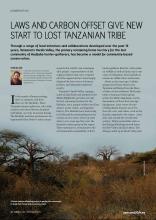Land Library
Welcome to the Land Portal Library. Explore our vast collection of open-access resources (over 74,000) including reports, journal articles, research papers, peer-reviewed publications, legal documents, videos and much more.
/ library resources
Showing items 1 through 9 of 18.Includes the indigenous peoples of Ethiopia; Ethiopia’s dire context; food insecurity; land grabs, conflicts and food security; development by displacement I: Ethiopia’s land investment policies; table of land deals with foreign companies in Gambela since 2007; development by displacement II: Eth
The African Court on Human and Peoples’ Rights has issued a landmark judgement for marginalised communities across Africa. It ruled that the Kenyan government violated the rights of the Mau Ogiek people by evicting them from their ancestral land in the Mau Forest complex.
Includes tenure risk, conflict, and the path to prosperity, 2016 in depth: fear, violence and defence, communities face ever increasing criminalization and violence for practicing their traditional livelihoods and protecting their lands.
Section I provides an overview of large-scale land deals. It assesses the trend at a global level and examines structural obstacles faced by efforts to regulate such deals.
Pastoralist and hunter-gatherer communities in Tanzania are gaining rights to own and control their land as the foundation for generating new income through REDD+
Examines recent progress on developing indicators to measure land rights as part of the new Sustainable Development Goals (SDGs) in 2016.
As organizations working on food security, natural resources management and poverty eradication, we strongly encourage governments to keep the profile of land and natural resources high in the post-2015 Sustainable Development Agenda document to be endorsed in September 2015.
Through a range of local initiatives and collaborations developed over the past 15 years, Tanzania’s Yaeda Valley, the primary remaining home territory for the last community of Hadzabe hunter-gatherers, has become a model for community-based conservation.
In this publication two pioneering grassroots organisations from northern Tanzania examine and present their experiences and insights from their long-term work to secure the land rights of hunter-gatherer and pastoral communities.




